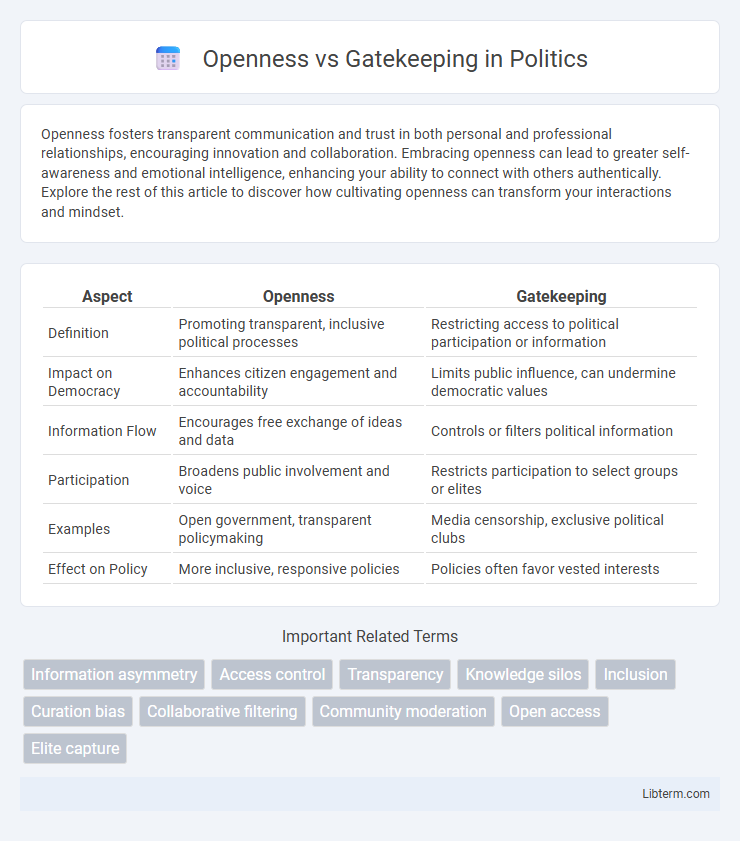Openness fosters transparent communication and trust in both personal and professional relationships, encouraging innovation and collaboration. Embracing openness can lead to greater self-awareness and emotional intelligence, enhancing your ability to connect with others authentically. Explore the rest of this article to discover how cultivating openness can transform your interactions and mindset.
Table of Comparison
| Aspect | Openness | Gatekeeping |
|---|---|---|
| Definition | Promoting transparent, inclusive political processes | Restricting access to political participation or information |
| Impact on Democracy | Enhances citizen engagement and accountability | Limits public influence, can undermine democratic values |
| Information Flow | Encourages free exchange of ideas and data | Controls or filters political information |
| Participation | Broadens public involvement and voice | Restricts participation to select groups or elites |
| Examples | Open government, transparent policymaking | Media censorship, exclusive political clubs |
| Effect on Policy | More inclusive, responsive policies | Policies often favor vested interests |
Understanding Openness and Gatekeeping
Understanding openness involves recognizing transparent communication, inclusivity, and unrestricted access to information, which drives innovation and collaboration. Gatekeeping refers to controlling, filtering, or restricting access to knowledge or resources, often shaping which information reaches specific audiences. Balancing openness and gatekeeping is crucial for fostering trust while maintaining quality and security in information dissemination.
The Roots of Openness in Modern Society
The roots of openness in modern society can be traced to the Enlightenment era, which emphasized reason, individual liberty, and the free exchange of ideas. Digital technology advances, especially the internet, have further accelerated openness by enabling unprecedented access to information and global communication. Movements promoting transparency, collaboration, and inclusivity continue to challenge traditional gatekeeping institutions that restrict knowledge and cultural participation.
Historical Context of Gatekeeping
Gatekeeping has historically played a crucial role in controlling access to information, resources, and cultural narratives, often shaping societal power structures. Traditionally, gatekeepers such as editors, publishers, and institutions determined which knowledge and voices were amplified or suppressed. This selective control influenced public discourse, social norms, and the dissemination of ideas throughout history.
Openness: Benefits and Opportunities
Openness in digital ecosystems fosters innovation by enabling unrestricted access to data and resources, which accelerates collaboration and idea exchange among diverse stakeholders. It enhances transparency and trust, facilitating user empowerment and community-driven development that adapt to evolving needs. Open platforms reduce entry barriers for startups and developers, stimulating economic growth and driving technological advancements across industries.
Gatekeeping: Purposes and Pitfalls
Gatekeeping serves to maintain quality control, protect community standards, and ensure trusted content by filtering contributions based on established criteria. However, excessive gatekeeping can stifle innovation, exclude diverse perspectives, and create barriers to participation, limiting the growth and inclusivity of environments such as online platforms or academic communities. Balancing gatekeeping with openness is crucial to foster both reliability and creativity in collaborative spaces.
Impact on Innovation and Creativity
Openness fosters collaboration and the free exchange of ideas, significantly accelerating innovation and creativity by allowing diverse perspectives to merge and evolve. Gatekeeping, while potentially maintaining quality control, can stifle creative expression and limit access to new ideas, hindering problem-solving and breakthrough developments. Balancing openness with selective gatekeeping promotes a dynamic environment where innovative concepts thrive while maintaining standards.
Openness and Gatekeeping in Digital Spaces
Openness in digital spaces fosters inclusivity, collaboration, and free exchange of information, enabling communities to grow and innovate without barriers. Gatekeeping, however, imposes restrictions that control access to content and participation, often based on predefined criteria that can limit diversity and representation. Balancing openness with necessary gatekeeping mechanisms is crucial to maintaining safe, reliable, and high-quality digital environments.
Balancing Inclusion with Quality Control
Balancing inclusion with quality control requires establishing clear criteria that enable diverse contributions while maintaining high standards. Implementing transparent review processes ensures that openness does not compromise content integrity, fostering trust and credibility. Effective gatekeeping sharpens focus on valuable inputs, promoting innovation without sacrificing reliability.
Case Studies: Successes and Failures
Case studies on openness versus gatekeeping reveal diverse outcomes across industries. Open access models in publishing, such as PLOS ONE, demonstrate increased citation rates and global knowledge dissemination, while gatekeeping strategies in tech firms like Apple ensure high product quality but limit innovation from external developers. Failures often stem from overly restrictive gatekeeping that stifles collaboration or excessive openness leading to information overload and compromised quality control.
The Future of Openness and Gatekeeping
The future of openness versus gatekeeping will be shaped by the growing demand for transparency, accessibility, and decentralized control across industries like technology, media, and academia. Innovations such as blockchain and open-source platforms promote democratized access while simultaneously challenging traditional gatekeepers who control information flow and authority. Balancing the benefits of open ecosystems with the need for secure validation and quality assurance remains a critical focus for evolving governance models in digital and knowledge economies.
Openness Infographic

 libterm.com
libterm.com